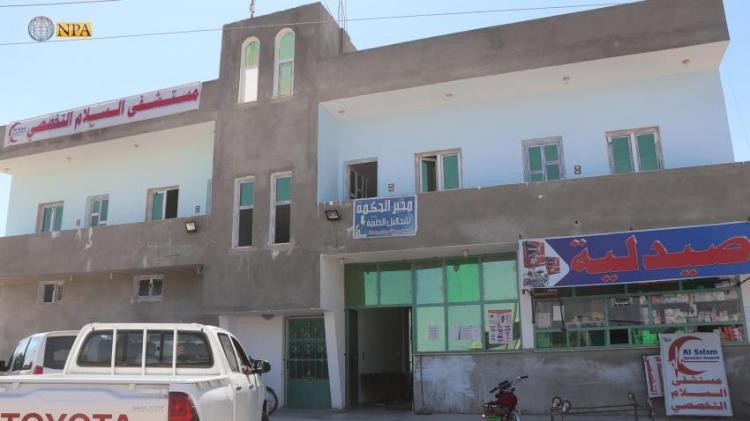Deir ez-Zor – North-Press Agency
Jindar Abdulqader
Three governmental hospitals and twenty private ones serve the residents of Deir ez-Zor with partial services, old equipment, and heavy costs, after the Syrian Democratic forces’ complete control over the eastern countryside of the governorate, upon the end of the battles in Al-Baghouz and ISIS territorial defeat on the 23rd of last March.
Various regions of Deir ez-Zor are witnessing remarkable service weaknesses of the governorate’s Civil Council institutions, especially in the health sector, which in turn, is increasing the popular tension against the Autonomous Administration, which is facing serious security threats because of ISIS sleeper cells, which affects the re-establishment of the civil life in the region.
The poor medical reality leads the people of the city to receive treatment in private hospitals, in light of the low level of services in the public hospitals and clinics, which cost them a lot of money, as well as the impact of geographical dimensions of the major human communities, as in the cities of Al-Suwar, Al-Busayrah and Hajin on increasing the suffering of the people of Deir ez-Zor.
Moreover, military and political officials of the Global Coalition keep on constant visits to the areas of Deir ez-Zor, to inspect the latest civilian and military situation there, with repeated promises to improve the situation through its logistical support, but practically without a serious response.
Excessive Costs
Residents of the eastern countryside of Deir ez-Zor keep complaining about the poor services of private hospitals in the region, acknowledging that the management of those private hospitals are exploiting the situation of the region to individually control the prices, in light of the scarcity of free services due to the lack of hospitals and public clinics.
Salha al-Salloum al-Drak, a 50 years old woman, traveled more than 50 km from her village near the city of Al-Busayrah for a surgery for her sick daughter-in-law, “The clinics do not provide us with any services or medicines, and there are even no doctors,” she complained, “while nurses and employees’ bags contain embezzled medicines”.
She briefly continues as she looks at the hospital’s front gate while explaining that she hasn’t got enough money for the operation today, as she says that the surgical operation with the medicines cost about SYP 80,000 ($135), let alone the costs of traveling from Al-Suwar to Al-Busayrah.
Salha concluded her talk while demanding the Deir ez-Zor Civil Council to open a new hospital in the city of Al-Suwar to provide medical services for the people.
On the other hand, Zahed Hammadi, the director of Al Hammadi Specialist Hospital in Al-Busayrah told North-Press: “The high prices of diagnoses and surgery operations are due to the high costs of medical equipment and the salaries of nurses and doctors,” citing the costs of water insurance and power generators.
Al Hammadi Specialist Hospital provides modest services such as cesarean operations, urinary, and general surgery, in addition to the laboratory, nursing department and a special section for children.
“Modest” hospitals
The region lacks modern medical equipment that helps to provide good medical services; therefore, it relies on a number of devices that some are considered as “expired”, which leads hundreds of patients to go to other cities such as Hasakah and Raqqa.
Zahed Al-Hammadi points out that neurosurgeon and vascular surgery is not available in the whole city of Deir ez-Zor, because of the lack of equipment.
In October 2017, Deir ez-Zor Civil Council rehabilitated Al-Kasrah General Hospital, which provides free services for about 600,000 people, according to the director of the hospital Ahmad Al-Omair.
Moreover, the hospital, which is known for its accepted services, has many specialties, including general and gynecological surgeries and physiotherapy, as well as the availability of clinics such as neurology, internist and children.
Ahmad Al-Omair said that they need to activate the blood bank, laboratory and radiology equipment, as well as the need to provide a special section for dialysis.
Al-Kasrah Hospital is one of three hospitals which were rehabilitated by the Health Committee of Deir Ez-Zor Civil Council, in addition to new hospitals such as Al-Bagara and Al-Busayrah.
While the Health Committee had begun the rehabilitation of Hajin Hospital after the rubble was removed and prepared for international organizations to fund the hospital projects, as well as Abu Hamam Hospital, which is also out of service.
Husam al-Ali, the co-chair of the Health Committee of Deir ez-Zor Civil Council said: “Their works are very few because of the lack of support and fund,” as he called on the international organizations to provide services to the region of Deir ez-Zor, as he described it “safe” for humanitarian works.
Al-Ali pointed to the need of general hospitals for radiology, magnetic resonance, and dialysis devices, stressing that there is only one single operation room operating for free in the whole region of Deir ez-Zor, adding that the hospitals of Al-Busayrah and Jadidat Al-Bagara require many devices in order to provide better services.

